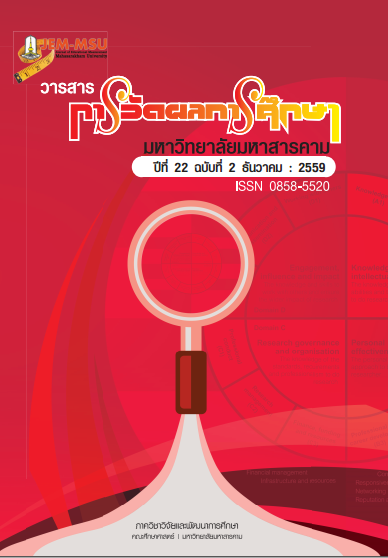การพัฒนาโปรแกรมการส่งเสริมและพัฒนาความสามารถในการคิดแก้ปัญหาอนาคต ของนักเรียนชั้นมัธยมศึกษาปีที่ 2
Main Article Content
Abstract
The purposes of this study are as follows: 1) to develop the future problem solving
skill support and improvement program for grade 8 students and 2) to evaluate the performance
of the developed program. The study is a mixed method research study with two stages.
For stage 1, the program was tentative developed by synthesizing data from focus group,
supervised study and instructors in order to develop program for conducting learning
activities and synthesizing steps for conducting the activities by using the problem solving
processes. For stage 2, the tentative developed program was tested with the target group
including 28 grade 8 students studying in the 2nd semester in the academic year of 2014 in
Ban Lao School, Phayakkhaphum Phisai District, MahaSarakham Province. Research instruments
consist of 1) the future problem solving skill support and improvement program, 2) the
focus group guidelines, 3) short answer item test for measuring the future problem solving
abilities with two items with the validity of 0.80 to 1.00, with item discrimination from .39 to
.50 and the reliability of .90, 4) the questionnaire for satisfaction towards the developed
program with five-level rating scale, 20 items and the discrimination of .33 to .78. and the
reliability of .91. The data analysis consists of two parts: 1) analyzing the data about the
elements of learning activities from the focus group, instructors and supervised study and
2) analyzing the data from the developed program that was tested in teaching activities.
Statistics used for the data analysis include percentage, average and standard deviation.
The results were as follows.
1. The components of the developed program were as follows: 1) principles
2) objectives 3) learners’ characteristics 4) users’ characteristics 5) learning processes 6)
required equipment, books and other materials, and 7) measurement and evaluation.
2. The efficiency value (E1/E2) of the developed program was 80.13/81.10 and
met the specified criteria. The effectiveness index of the developed program was 0.7029.
This means that the grade 8 students’ future problem solving skill was increased for 70.29
percent. The level of the student’s satisfaction who joined the developed program towards
the activities in the program was high level (µ =4.25, σ= 0.83). By considering specific terms,
it was found that the student’s satisfaction was high level in all terms. The highest satisfaction
level was in terms of benefit (µ =4.33, σ= 0.81) followed by learning activity (µ =4.32, σ=
0.74) and learning atmosphere (µ =4.09, σ= 0.93), respectively.
In conclusion, the developed program was appropriate efficiency and effectiveness
for using in schools in order to improve students’ problem solving skill.
Article Details
The content and information contained in the published article in the Journal of Educational Measurement Mahasarakham University represent the opinions and responsibilities of the authors directly. The editorial board of the journal is not necessarily in agreement with or responsible for any of the content.
The articles, data, content, images, etc. that have been published in the Journal of Educational Measurement Mahasarakham University are copyrighted by the journal. If any individual or organization wishes to reproduce or perform any actions involving the entirety or any part of the content, they must obtain written permission from the Journal of Educational Measurement Mahasarakham University.


